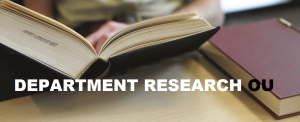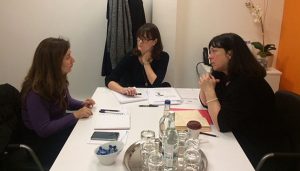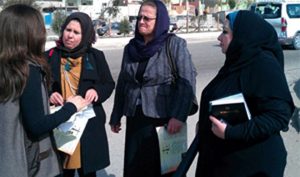Dealing with the past, imagining the future
The effects of war stretch far beyond the battlefield. Many women who have suffered sexual violence in Iraq now find that the process of seeking justice through the legal system inflicts new trauma on them as they are forced to relive their experiences. But new research by Dr. Siobhan Campbell, Dept. of English and Creative Writing, The Open University, and Dr. Meg Jensen of Kingston University London, shows that the use of expressive writing techniques may work to enhance resilience, enable victims to seek justice, and even contribute to social integration.
Expressive life writing is a humanities-based intervention often employed in post-conflict situations, or during periods of cultural reconstruction. Using exercises and prompts adapted by Campbell for the ‘safe place’ created by a workshop, expressive writing can elicit stories in ways that one-to-one interviewing based on current protocols cannot. Campbell’s previous research in non-conflict settings and with combat veterans has demonstrated that the process of writing down reflections and working with the imagination to narrate what is previously unsaid helps survivors ‘detach’ from negative experiences by turning them into shareable stories, thus increasing their sense of well-being and of agency.
How the Expressive Life Writing Project works
Expressive Life Writing puts the creative writing tenet ‘learning by doing’ at its core. It values what can be observed occurring as part of the context of convening, encouraging and recording the writing and the founders believe that the story surrounding the emergent writing should also be told as part of its dissemination.
In 2016-17 we collaborated with INMAA for development, a NGO working to foster human rights and provide legal aid. The aim was to offer expressive writing and telling opportunities to women victims of violence and trauma in Kirkuk Governorate, Iraq. The project also used iterative practice to work with stakeholders on the ground in order to look at current guidelines on the documentation and investigation of rights violations and suggest adaptations to existing protocols for the interviewing process. We developed this work with the support of Beyond Borders Scotland, a not-for-profit organisation facilitating international cultural exchange, and the research was funded by the UK Foreign and Commonwealth Office (FCO), Human Rights fund.
INMAA employ a team of Mobile Human Rights Defenders to document instances of sexual violence in conflict. However, it had come to their notice that as not all cases can be brought the juridical route, there was an opportunity to use the site of interview to begin to elicit and value the stories of individuals in ways which might support them in other ways.
Asmaa Al Ameen (INMAA), Meg Jensen (KUL) and Siobhan Campbell, The Open University
In collaboration with the General Director of INMAA, Asmaa Al Ameen, we developed writing and ‘telling’ (where writing was not useful) exercises in a three-unit model that could be employed at the point of INMAA’s initial interview with prospective clients but that had an implicit follow-up built in, thus making it more likely that the clients would return. We provided training to the social workers in the uses and implications of the workshop exercises, practicing these with them as part of the training. The emphasis was on exercises which allowed for recounting of experience but also for ‘imagining the future self’ as part of the set of tools for enabling the witness/survivor to produce and integrate their whole life story in ways that develop a sense of ownership and agency.
A handbook produced in both English and Arabic, was used by the mobile human rights team. It contains original Expressive Life Writing exercises and storytelling prompts developed by Siobhan, and is accompanied by guidelines to enable the efficacy of the workshops to be tracked.
Asmaa Al Ameen writes in the project report:
The work by Beyond Borders contract teams from The Open University and Kingston University on the Expressive Writing project has gone well beyond expectations in the depth and comprehensive material they have produced. This in turn enabled the INMAA team to reflect on and improve their working practices especially with respect to the interface with victims/clients. The training you have provided to our team of human rights lawyers and social workers has changed the way we work with victims and allowed us to allow these victims to tell their stories.
INMAA outreach, Kirkuk
What next? Impact for the future
As we gather quantitative and qualitative forms of feedback, Campbell and Jensen will further develop the virtual learning environment toolkit of research-based and practicable teaching materials for effective, creative life narrative workshops in post-conflict contexts.
Identifiable outcomes of this work include:
>> Relationship Building – allowing for adaptive change in contested situations
>> Capacity Building – both among activists and those they serve
>> Learning to Learn – a distinctive ability to self-reflect on practice is engendered
>> Creative Expression and personal sharing – individual experience is valued over process
Already, this work has resulted (January 2018) in the development of a UNDP SIRI (Support for Integrated Reconciliation) project in Iraq where Campbell and Jensen are providing bespoke training in expressive writing techniques and workshop convening to UNDP reps, supplying PowerPoints and handbooks in Arabic for use on the ground.
For post-ISIL Iraq, as outlined by UNDP to Siobhan and Meg, the top priorities are ensuring stability and a return to peaceful coexistence, with a view ultimately towards implementing transitional justice, de-radicalization and institutional reform.
The value placed on individual experience and the possible functional value of expressing and recording that experience in a supportive and coherent space is what training in Expressive Life Writing techniques can help achieve. It can provide a sense of coherence and unity of purpose within the groups that undertake the exercises, discussions and the group workshop work.
With expressive telling and writing, vital goals such as social integration and de-radicalization are supported, since this expressive work values not only the expression of one’s own personal experiences, but the skill of intentionally listening to the experiences of others. In conflict and post-conflict contexts in particular, Expressive Life Writing can provide a powerful counterpoint to pre-existing social and political divisions and mistrust as evidenced by the research of Campbell and Jensen and our projects in Iraq.
For more information contact Siobhan Campbell on Siobhan.Campbell@open.ac.uk




Many thanks for this thought-provoking, clear, concise and informative post, Siobhan. Your work on expressive life writing really demonstrates the ways in which our individual engagements with literature shape our ‘life stories’, thereby providing a means of self-assertion, even through episodes of trauma. Did you make audio or video recordings of any of the expressive life writing workshops in Iraq, and if you did, did this raise any ethical issues that had to be overcome? Did participants in the expressive life writing workshops request anonymity, or did they assert their own individual identity through the workshop activity?
A further note for readers of this blog post: if you are interested in exploring some of the ways in which people have used books as a cure (or as a respite) from conflict and trauma, Siobhan Campbell, Edmund King and Sara Haslam are co-organising a conference, ‘The Book as Cure: Literary Bibliotherapy from the First World War to the Present’ at the IES, Senate House, London, on 14 September 2018. You can find the Call for Papers and more information here: http://www.ies.sas.ac.uk/events/conferences
Replying to Shaf Towheed –
Thanks so much for your comments and apologies for the delay in reply! No, we did not make audio or video recordings as the level of nervousness among participants was already high. Some were attending without full family approval. Anonymity was guaranteed for the writing workshops but not of course where people were moving on into the juridical process. And thank you Shaf for posting the call for papers for our conference in September here – it may well help to generate interest in this strand of the thinking around humanities interventions.
Siobhan C.